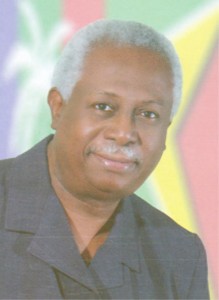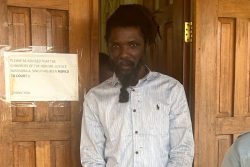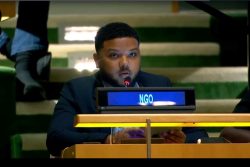The Guyana Forestry Com-mission (GFC) yesterday said that timber company UNAMCO has not made a convincing case to government for the renewal of its Timber Sales Agreement (TSA), after consistently falling short in production, while racking up debts in royalties and acreage fees owed to the state.
In a statement issued yesterday, the GFC said the government told UNAMCO during its engagement that a prerequisite for renewal was productive utilization of its concession and compliance with terms and conditions of their agreement. “Unfortunately, UNAMCO has not met these requirements,” it said, “Neither has it satisfied the government that they have the ability to utilize the concession to its fullest potential.”

UNAMCO advisor Hamley Case, however, yesterday dismissed the claims. Last week, he told Stabroek News that the company was crippled by government’s failure to renew its lease after it expired. He also disclosed that there have been recent raids on the concession by bandits, who have removed and destroyed most of the company’s equipment for scrap metal. Case, who at one time served as the managing director of UNAMCO, said the company has been trying since before the lease expired to have it renewed but this has been met by the royal runaround.
Responding to Case’s complaints, the GFC noted that its records show that UNAMCO was granted a 15-year Timber Sales Agreement (TSA) in January, 1992, permitting a 237,000 acre concession on the left bank of the Berbice River. However, it said that from the issuance of the lease to the time of its expiration, the UNAMCO concession never produced to its full potential, reaching just 5% of its allowable productive capacity in 2005 and 2006. During that time, the total production was approximately 3,200 cubic meters, when it should have been approximately 60,000 cubic meters, representing 5.3% of its allowable cut.
Case explained that the 15-year TSA had been granted to a company named UNAMCO in 1992, which was owned by a local businessman. He explained that the company subsequently found itself in financial trouble and was in the process of being shut down by the government. In 1994, his company-Case Timbers-and the Malaysian company Tenaga Khemas owned by Malaysian businessman Villupillai Kanagalingan, bought over the main shares of UNAMCO and settled all of its debts. He said that under the agreement, 80% was owned by the Malaysian investor, 15% by Case Timbers and about 5 percent by the businessman.
He dismissed the claim that the company failed to reach its allowable productive capacity, saying that the amount that the GFC was asking it to cut was way above the maximum level that a concession was permitted to legally cut annually.
Meanwhile, the GFC also charged that UNAMCO had incurred significant debts in terms of royalties and acreage fees owed to it. At one point, it said, the amount stood at approximately $20M and while the company entered into several repayment agreements it always defaulted. It was not until September 2007 that the company paid off its debts, after the lease expired.
Case said that the claim was not completely true since the company always paid its royalties and acreage. He admitted that there were occasions that UNAMCO may have made the payments late and he said that all the timber companies are guilty, saying he knew it to be a fact as he had been a Director of the GFC.
The GFC said the areas of non-compliance were repeatedly communicated to the company via formal letters and meetings with the company´s senior executives and during the period 2005 to 2007 more than 10 meetings had been held with senior executives of the company and the government, including the Minister of Agriculture and President Bharrat Jagdeo. Promises were made by the company to improve on its production and to realize their investment but unfortunately nothing substantial happened, the GFC added.
Case refuted the argument and said that as far as he was aware, no meeting was ever held with UNAMCO officials where President Jagdeo was present.
He did say that in the past the company’s management had met with the late Presidents Dr. Cheddi Jagan and Janet Jagan and that was the last time they ever met with any Head of State.
The GFC further said that the company continuously defaulted in its submission of critical information to the GFC such as annual plans of operations (AOP), saying its failure to do so was evidence of the company´s weak management planning. In response, Case said the company always submitted its annual plans of operations as required.
The GFC also said that “the company never invested in capital equipment as represented to the Government; it only made repeated promises to do so which never came to fruition. Efforts to get the company to upgrade and replace existing equipment had all been futile. Employment also continually declined over the years.” Case said that the company had initially invested in the equipment, which was subsequently destroyed. He said that plans were on course to purchase new equipment valued at US$3M but it was awaiting the renewal of the lease. Case said this point came up several times during the meetings held between GFC and UNAMCO officials concerning the extension of the lease. He said that a company could not be expected to invest substantially in equipment when there was no guarantee about its future.
As it relates to the attacks by the bandits, the Commission said that “it is the responsibility of the concession holder to secure the boundaries of its concession.” It was emphasized that the security rests solely with the company.








